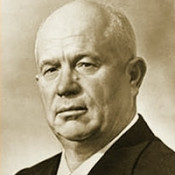
Nikita Sergeyevich Khrushchev elected the Chairman of the Council of Ministers of the USSR
On March 27, 1958 Nikita Sergeyevich Khrushchev took the post of the Chairman of the Council of Ministers of the USSR combining it with the post of the First Secretary of the Central Committee. He had been holding these positions until October 14, 1964 when the October plenum of the Central Committee, convoked during Khrushchev’s vacation, relieved him from all the party and state positions ‘due to a poor state of health’.
N. S. Khrushchev was born in 1894 in the village of Kalinovka, Kursk region in a family of worker. In 1918 he joined the Bolshevik party. After the end of the Civil war he fulfilled the economical and party work in Ukraine. In 1929 he studied in Industry Academy in Moscow and then served as a party member. From the middle of 1930s he occupied the post of the First Secretary of Moscow Committee and Moscow municipal committee of the all-Union Communist Party. Later he became the First Secretary of the Central Committee of the Communist Party of Ukraine.
During the Great Patriotic War N. Khrushchev was a member of military councils of the South-Western direction. In 1943 he received a military rank of Lieutenant General. After the war he served as the Chairman of the Council of Ministers of Ukraine and then was again elected the First Secretary of the Central Committee of the Communist Party of Ukraine. From December of 1949 he was transferred to the post of the First Secretary of Moscow regional Committee and the Secretary of the Central Committee of the Party.
After the death of I. V. Stalin, Khrushchev was one of the main originators of dismissal from all the posts and the arrest of the assistant to the Chairman of the Council of Minister of the USSR, the Minister of Domestic Affairs, Marshal of the Soviet Union L. P. Beria who was accused of ‘antiparty and antistate activities intended to undermine the Soviet state’.
In September if 1953 N. Khrushchev was elected the First Secretary of the Central Committee. Three years later at the 20th Congress of the party he made an accusing speech in regards of Stalin’s personality cult. Having gained the victory over Stalin’s former companions-in arms V. M. Molotov, G. M. Malenkov and L. M. Karanovich during June plenum of the Central Committee in 1957, N. Khrushchev took the highest governmental post in 1958.
During October plenum of the Central Committee of 1964 which stripped Khrushchev of power it was acknowledged unreasonable for him to continue to combine the duties of the Party’s leader and the government leader.
Lit.: Искандеров А. И. Мемуары Н. С. Хрущёва как исторический источник // Вопросы истории. 1995. № 5-6; Медведев Р. А. Никита Сергеевич Хрущёв. Политическая биография. М., 1990; Попов Г., Аджубей Н. Пять выборов Никиты Хрущёва // Наука и жизнь. 2008. № 1; Превратности судьбы. О двух поворотных рубежах в политической биографии Н. С. Хрущёва. М., 1994; Хрущёв Н. С. Воспоминания: Избранные фрагменты. М., 1997;; Хрущёв Н. С. Доклад на закрытом заседании XX съезда КПСС «О культе личности и его последствиях». М., 1959; Хрущёв С. Н. Никита Хрущёв: кризисы и ракеты: Взгляд изнутри. М., 1994.
Based on the Presidential Library’s materials::
Страницы советской истории : [фрагменты кинохроники]. СПб., 2011.

